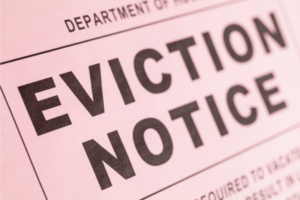What to Do When Things Go Wrong: How to Handle Landlord/Tenant Disputes
 No matter how carefully a landlord follows rental rules and screens tenants, sometimes things still go wrong. As a landlord, you have the right to expect your tenants to pay rent on time and abide by the terms of their lease. Tenants are also required to keep the rental property safe and sanitary, including exterminating insects that were not present at move-in, providing prompt notice of maintenance issues, and leaving the property in good condition (normal wear and tear excepted).
No matter how carefully a landlord follows rental rules and screens tenants, sometimes things still go wrong. As a landlord, you have the right to expect your tenants to pay rent on time and abide by the terms of their lease. Tenants are also required to keep the rental property safe and sanitary, including exterminating insects that were not present at move-in, providing prompt notice of maintenance issues, and leaving the property in good condition (normal wear and tear excepted).
What should you do if a tenant doesn’t hold up their end of the bargain and a dispute develops?
Document Everything
In any disagreement with a tenant, always communicate clearly and document all efforts to correct the problem. Having conversations with tenants over email or some other form of writing is always best, but not always practical. Take written notes of any oral conversation and send follow-up emails or letters documenting the conversation with agreements, requests, or demands. It will usually benefit you to try to resolve a disagreement peacefully. If this is not possible, however, you may need to consider eviction.
Follow Legal Requirements
If you decide that eviction is necessary, be sure to follow the legal requirements exactly. Landlords cannot engage in self-help eviction, such as changing the locks or removing personal items. Retaliatory eviction is also prohibited. For example, you cannot attempt to evict a tenant or raise their rent because the tenant has complained that the property is not habitable or that you have failed to make a necessary repair.
Permissible reasons and notice requirements for eviction in Michigan are set out in MCL 600.5714(1). The first step in the process is to issue a “Notice to Quit.” The notice must give the tenant a certain amount of time to move out, depending on the circumstances. The following are some legitimate reasons for eviction and the notice requirements for each:
- Non-payment of rent. If a tenant does not pay rent by the due date, you can issue a 7-Day Notice to Quit.
- Unlawful possession. If the rental period is over and the tenant has not vacated the premises or is otherwise staying at the premises unlawfully, you can issue a 30-Day Notice to Quit.
- Unlawful activities. If the tenant violates a building, housing, or health and safety code or is causing extensive and continuing physical injury to the property, you can issue a 7-Day Notice to Quit. A 7-Day Notice is also appropriate if a tenant has physically injured or has threatened to physically injure others on the rental property and a police report has been filed.
- Illegal drug activity. If the lease so specifies and a police report is filed, a 24-Hour Notice to Quit is sufficient for eviction due to illegal drug activity.
- Violation of a lease provision. If the tenant has violated a lease provision, you can issue a 30-Day Notice to Quit.
- Just cause. Evictions of tenants of government-subsidized housing for holding over must be for “just cause,” according to the local housing commission rules or other applicable laws. “Just cause” for eviction of mobile home tenants is governed by MCL 5775.
Prepare and Deliver a Valid Eviction Notice
Many district courts provide standard eviction forms, but a letter is sufficient if it includes all required information. A Notice to Quit must state the tenant’s name, the rental address or property description, the legal reason for the eviction, any time allowed for the tenant to take remedial action (by paying rent, for example), the date, and the landlord’s signature (MCL 600.5716).
Eviction notices must be delivered in person to the tenant or a member of the tenant’s household “of suitable age” or sent to the tenant by first-class mail. Electronic service is also acceptable if the tenant has agreed to this and the agreement has been confirmed by the electronic means specified. The notice period begins to run the next mail delivery day after a notice is mailed or the day after personal service (MCL 600.5718).
File a Summary Proceedings Action
New landlords are sometimes distressed to learn that a tenant is not required to move immediately once an eviction notice expires. Expiration simply permits the landlord to file an action in district court, known as a summary proceedings action (MCR 4.201). District courts have preapproved summons and complaint forms for eviction actions. You will need to complete the approved forms, attach the eviction notice and the lease, file the paperwork in the appropriate court, and serve it on the tenant. The summons will order the tenant to appear in court at a specified date and time.
If there is a dispute and the court holds a hearing, the landlord must first present evidence of the lawful reason for eviction. The tenant will then be able to respond and raise any applicable defenses (such as retaliatory eviction). If the landlord is successful and receives a judgment for possession, in most cases, there will be a 10-day waiting period before the court issues an eviction order (MCL 600.5744). Only an officer of the court (usually someone from the sheriff’s office) can execute the order and remove the tenant and the tenant’s property from the premises.
If you are having a dispute with a tenant and need guidance or help with the eviction process, contact one of Kreis Enderle’s knowledgeable civil litigation attorneys to discuss your situation.
